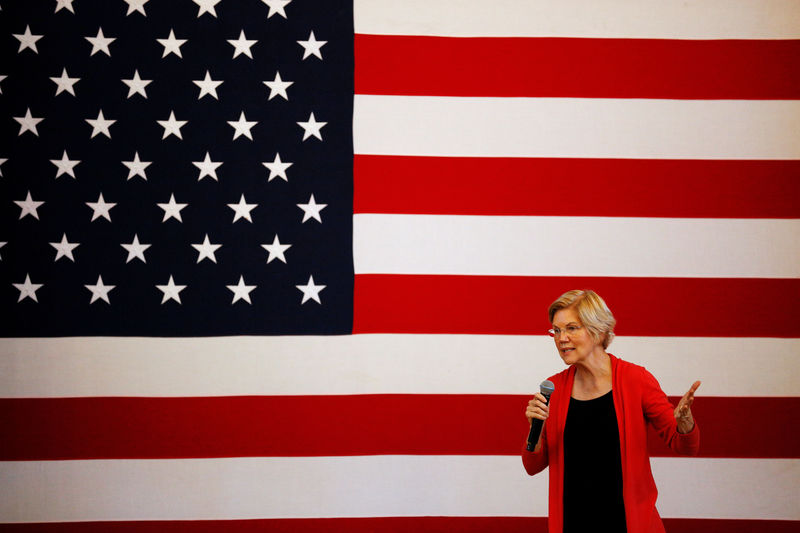WASHINGTON (Reuters) - Democratic presidential candidate Elizabeth Warren on Monday warned of "serious" signs that the U.S. economy could skid into a downturn either this year or next, as she proposed a series of steps to minimize the risk.
Warren, 70, who serves in the U.S. Senate and is considered a top-tier candidate in a crowded field of Democrats hoping to challenge President Donald Trump in the Nov. 3, 2020 election, called on federal regulators and Congress to act "before another crisis costs America's families their homes, jobs and savings."
In a statement, Warren said "warning lights are flashing" and the chances of a downturn are "high and growing."
The U.S. economy has been expanding for 10 years, the longest on record, with low unemployment and inflation, and a strong stock market.
Nevertheless, Warren labeled the U.S. economy "precarious" amid high household and student debt. She warned that an increase in interest rates could "plunge families over a cliff."
The Massachusetts lawmaker noted that corporations are holding a growing number of high-risk loans and the country is experience a downturn in manufacturing.
As an antidote, Warren called for a $2 trillion investment in environmental research, manufacturing and exports over the next decade to revitalize the industrial base. She estimated such investment would create more than 1 million jobs while also addressing climate change issues.
To help insulate the U.S. economy from potential shocks, Warren called on federal regulators to abide by steps to stop banks from issuing risky corporate loans. She also urged the Trump administration to stop encouraging the UK to leave the European Union unless a firm Brexit strategy is in place.
Several public opinion polls show former Vice President Joe Biden leading a pack of two-dozen candidates seeking the Democratic Party nomination.
Warren is thought to be positioned among the top four candidates in the early days of campaigning, along with Biden and Senators Bernie Sanders and Kamala Harris.
Warren's standing among potential Democratic voters has been bolstered by the sheer number of policy proposals she has unveiled compared with her competitors.
In forecasting an imminent economic downturn, Warren boasted that she had issued warnings of an economic crash years before the severe recession that took hold in 2008, "but the people in power wouldn't listen."
